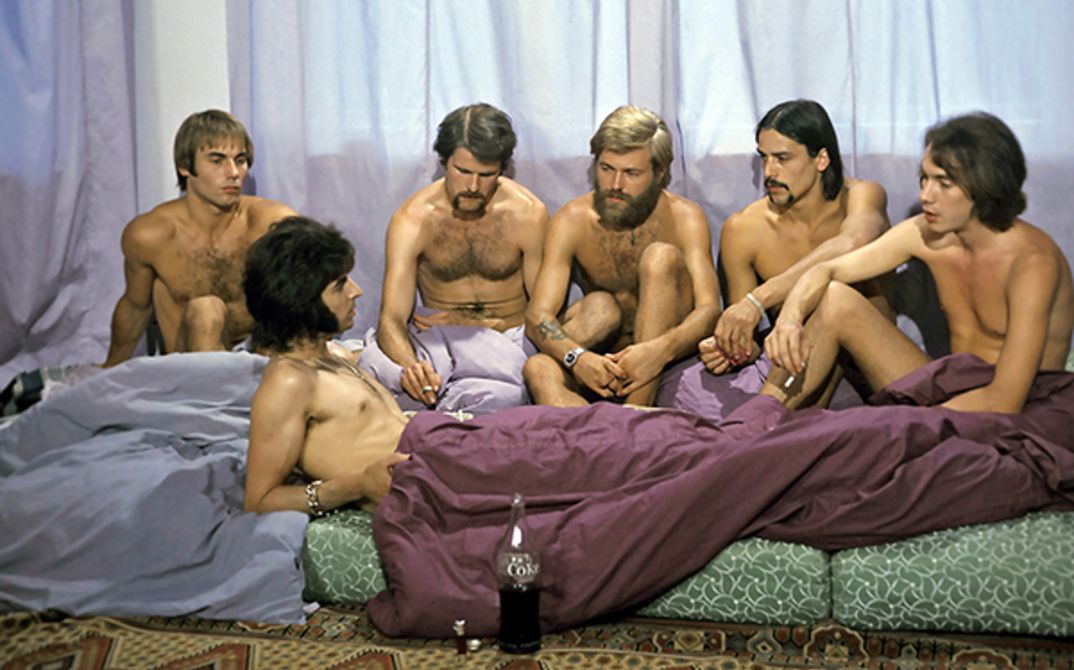Made by homosexuals for homosexuals
(...) We didn’t want to make a mendacious conformist film that presents the homosexual as a mostly male, dapperly clean fellow who has lived happily and inconspicuously with a boyfriend for thirty years. Liberals and gays alike would surely have wished for nothing more than a film that begs “normal people” for tolerance through a yearningly inhibited gay gaze.
The gay world, as we all know too well, is depressing. And we also know who we have to thank for that. We must develop solidarity and finally stop treating each other with hostility and envy. If we recognise that we all have the same problems and if we have the courage to help each other in public, then we will no longer have any reason to be so moody, hectic, and vain. We will become more human.
Although the film is made by homosexuals for homosexuals, it should not only be screened secretly in gay venues, but quite rightly on television, for example, so that homosexuals can no longer escape, but are brutally forced to either say “yes” to themselves or to live in constant fear of being found out and withering spiritually.
The film is intended as perfect dilettantism. The story could be from a pulp novel. The actors seem stiff and awkward. The climax of awkwardness, however, is the scene in the commune. It seems unreal and unnatural, but that’s intended to express nothing but honesty. It is the viewer’s damn duty to do his part. The commentator’s childishly over-precise enunciation is no coincidence. I’m convinced that the public would have been more willing to trust a regular radio announcer, but it would certainly have understood less. The whole film seems implausible, just as implausible as we all seem in the simplest situations. As long as film has existed, we have been spoiled and flattered by the mendacity of true stories taken from life. We do not yet notice today’s kitsch, but yesterday’s fits us much better. (Rosa von Praunheim)
“We now have the possibilities”: From an interview with Rosa von Praunheim
Do you ultimately have a message?
There is no message in the form of recommended behaviour. There is a reflection that criticises forms of behaviour and calls for a militant stance. This has parallels with the faction in America that calls itself the Gay Liberation Front and takes its orientation from the women’s movement and the Black Power movement. They organised a march through Central Park with 5,000 gays and people interested in the movement, including women and children.
What’s most important, as a first step, is that people admit their homosexuality, with those who can afford to do so leading the way. So that others are then taken along. And that most people can afford to do so, we noticed during filming. Of the few hundred people I approached, only three declined for occupational reasons. This shows that we now have the possibilities, the first conditions ever, to change behaviour and false ideals.
And the intention is also of attacking these fashionable, compulsive rituals, of getting rid of these spaces where it is so easy to “decompress” in order to replace them with relationships that last longer, though they need not last as long as a marriage.
I would say that now – under the banner of pseudo-liberality – there exists the possibility for homosexuals to fight for their problems themselves. I think it is nonsense to always wait for the “others” who fight for their rights. People should properly stand up for themselves – individually, in their environment, at their work. And above all, they should organise themselves.
(Interview: Christa Maerker, Infoblatt No. 25, 1. Internationales Forum des jungen Films, Berlin 1971, Download PDF)
